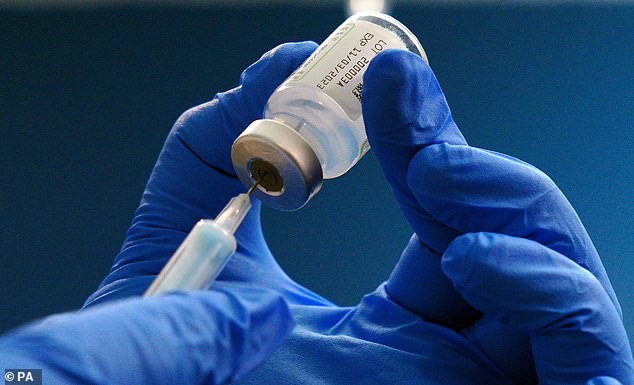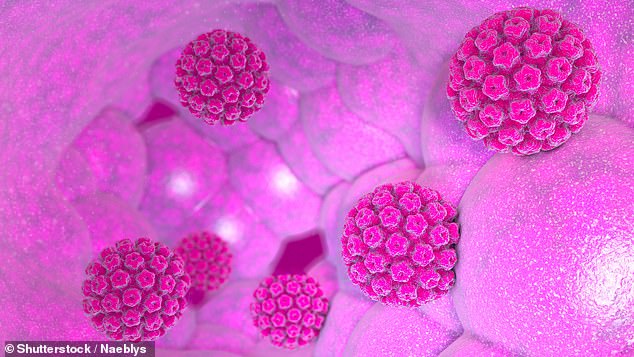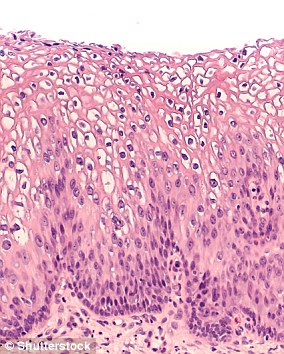HPV jab HALVES the number of cases of head and neck cancer in young men as new research shows the vaccine given to 12 and 13-year-old girls could prevent thousands of cases of male cancer
Research shows that the HPV vaccine will prevent thousands of cases of head and neck cancer in men.
The jab – which is offered to all 12 and 13-year-old schoolchildren – is known to have reduced the rate of cervical cancer in young women by 90 percent.
A study of more than 5 million men and women in the United States found that the rate of head and neck cancer has been more than halved.
Thanks to the vaccine, the number of cases of head and neck cancer fell from 6.3 cases to 2.8 cases per 100,000 men.
The HPV shot helps protect against the human papillomavirus, a common virus that is spread through skin contact.
The HPV vaccine – offered to all 12- and 13-year-old schoolchildren – more than halved the number of cases of head and neck cancer, a new study shows

One study found that the vaccine reduced the rate of all HPV-related cancers among men from 7.5 to 3.4 cases per 100,000, and from 15.8 to 11.5 among women.
Catching the virus has been shown to increase the risk of several cancers, including cervical cancer, oral cancer, anal cancer, penile cancer and vaginal cancer.
Led by Thomas Jefferson University in Philadelphia, the study involved 5.46 million patients, 949,000 of whom received the vaccine between 2006 and 2008.
It reduced the rate of all HPV-related cancers among men from 7.5 to 3.4 cases per 100,000, and among women from 15.8 to 11.5.
The risk of cervical cancer in women also fell from 10.4 to 7.4 cases per 100,000, according to findings presented at the annual conference of the American Society of Clinical Oncology in Chicago.
There was no significant reduction in the number of cases of head and neck cancer in women, probably because it is more common in men.
Dr. Lawrence Young, an expert in molecular oncology at the University of Warwick, described the data as ‘very encouraging’.
He said: ‘What we are seeing is the beginning of what should be an even more significant decline.
‘The average age at which these tumors occur is around 50 years. So you will see an even greater reduction in the coming years.’
The vaccine has been offered to girls in England and Wales since September 2008, before being extended to boys in 2019.
This has had a ‘double effect’, reducing transmission of the virus through sexual contact and providing protection against HPV-related cancers in both sexes.
Experts say it is important to encourage participation among Year 8 boys, with the latest figures putting take-up at 65 per cent, compared to 71 per cent for girls.
Professor Young suggested better public health messaging was needed to promote the full benefits of the jab, rather than it being seen as a vaccine against cervical cancer.
He said: ‘I think there is very little understanding or appreciation of the impact of HPV on oral cancer, people have never heard of it. It is still relatively new.
‘We need to get that message out to young people in Britain, to say that this is a virus that is also associated with head and neck cancer and (the vaccine can) prevent you from getting that as you get older.’

Catching the virus has been shown to increase the risk of several cancers, including cervical cancer, oral cancer, anal cancer, penile cancer and vaginal cancer
Around 12,000 people are diagnosed with head and neck cancer in the UK every year, and this rate is expected to rise significantly over the next twenty years.
Dr. Glenn Hanna, an ASCO expert from the Dana-Farber Cancer Institute in Boston, said, “We know that the HPV vaccine reduces the rate of oral HPV infections.
‘But this study shows that vaccination reduces the risk of HPV-related oropharyngeal head and neck cancer, especially in boys and men. HPV vaccination is cancer prevention.’

